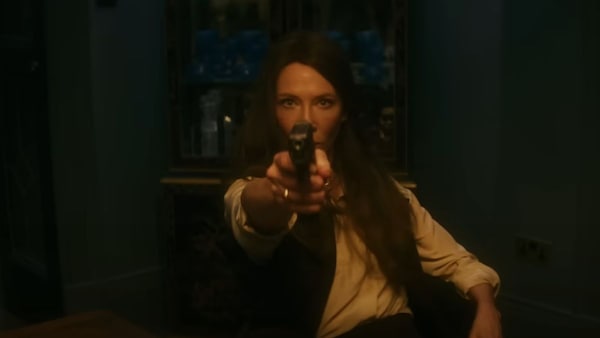Black Bag: A Love Story By Steven Soderbergh
In Soderbergh's London-set spy thriller, the very concept of espionage becomes a parable for the devaluation of trust in modern-day relationships.

Last Updated: 07.26 PM, Mar 28, 2025
SOME OF THE SEXIEST THRILLERS aren’t about the plot. They invite the viewer to slice through a perfectly sculpted body—not murderously, of course—and try to find a tiny, beating heart within. The sleekness of the body matters. And perhaps no contemporary filmmaker encourages such surgical eroticism more than Steven Soderbergh. His movies are so wildly watchable — even when they’re not great — because the style itself is the substance. Black Bag is perhaps his most complete work in a decade; it’s a London-set spy thriller where the very concept of espionage becomes a parable for the devaluation of trust in modern-day relationships. Soderbergh and writer David Koepp don’t come at it from a nostalgic back-in-our-day space. If anything, they fetishise what it takes to keep a tradition alive in an institution that’s rigged against the anatomy of faith.
The framework is clever. The film revolves around a cold-blooded British intelligence agent, George (Michael Fassbender), who must investigate a top-secret leak and find the traitor among his colleagues. The details are not important; let’s just say there’s the standard threat of a nuclear meltdown and dissolved governments. One of the five suspects, however, is Kathryn (Cate Blanchett), his wife and fellow intelligence agent. George and Kathryn are kind of an urban legend in the spy world — not because they’re excellent at what they do, but because they’re married and intensely committed to each other in a vocation that requires duplicity, roleplay and moral ambiguity. They’re a social anomaly, so much so that a dinner invite to their home feels like a “visit to our parents”. It’s a marriage so solid that when George goes up to Kathryn’s floor, everyone in her meeting (including her superior) automatically pauses — you can almost hear the mental eyerolls in the room. They’re used to it.

This little investigation becomes less about who the deadly mole is and more about whether a fabled togetherness can survive a demanding career. They’re spoken of as robotic legends in a sea of flawed humans. For others, cheating in their personal lives is a natural extension of professional lying; the former is normalised by the latter. Monogamy is extinct in their job. Its debris is everywhere. For instance, the first shot shows George’s superior assigning him the task and briefly referring to his own crumbling marriage; “why does cheating have to be so easy?” he wonders. The four suspects are two couples consumed by infidelity: Young satellite imagery specialist Clarissa is sleeping with boss Freddie, while agency psychiatrist Zoe is dating future star-spy James. Each of them is struggling to stay functional, sober and honest beyond the walls of the office.
George and Kathryn, in contrast, seem to have constructed an elaborate shield of communication to sustain their companionship. The title, Black Box, alludes to a phrase they use — a box of holy secrets — to honour the confidential information of their jobs. The rest abuse this phrase beyond the workspace, but this couple gets the difference between the cheating kind of lying and the lying kind of lying. Both of them are covertly aware that the other is watching from time to time, but this surveillance doesn’t stem from marital doubt. It’s a primal protective instinct; they do a dangerous job, and they want to use every tool possible to keep each other safe. When George mentions this to Clarissa in a tense situation, the young woman is so turned on by this rare declaration of personal allegiance that all she can blurt out is “that’s so hot”. Who can blame her Gen-Z-wired brain? It’s the funniest moment in a film that playfully recognises how staying in love these days is as psychotic as killing someone.

Wrapping this all up in a nifty spy movie supplies the reality of a world evolving at the cost of candid human connection. The middle-aged central couple is conditioned to do anything to maintain their bulletproof marriage — and somehow, they look like the crazy ones. It’s a neat optical trick. The film subverts the old generational-trauma trope of serial killers being products of abusive fathers and broken homes. Here, we learn at a drunken dinner that George is a serial monogamist for the same reason; killing is just a means to that end. He’s just as damaged, except his damage is mined to chase something pure. Kathryn is his partner in crime and grime; they have a process, an unspoken promise, that gets activated every time there’s the slightest threat to what they share. In a parallel universe, they’d be the sinister political couple of House of Cards, or the conflicted assassin couple of Mr. & Mrs. Smith.

But there’s something to be said about Soderbergh’s ode to old-fashioned solidarity. It’s more of a cultural callback than a technical one. The heist-like intrigue and vintage visual grammar, armed with that addictive Ocean’s-coded score, feel like a character trying to survive the plastic machinations of new-age storytelling. In a way, the warm palette belongs to George and Kathryn; the film speaks in their language because it’s rooting for their mature obsession. They stand for everything missing from a cinematic landscape that prompts plenty of why-are-romcoms-dead thinkpieces. Everyone else sees their domesticity as a weakness to be exploited, but they see it as a superpower they can summon.

At one point in the final act, that classic shot of a two-faced marriage emerges: The wife slips into bed after a secret trip, and the husband only pretends to sleep. His eyes are open. In most other films, they’d keep this act going till the end. But not these two; the man immediately turns over to discuss their ‘findings,’ and the tension is diffused. Maybe the tension was never there. Beneath its overlapping layers of good-looking people deceiving for a living, there lies an impossibly romantic movie that bats for devotion and demisexuality in an age of polyamorous and porous attachment. Legitimising the act of lying—in spycraft, or on social media and dating apps—cannot dilute the sensuality of truth. The technology of Black Bag is deployed to preserve the stillness of long-term feeling, not disrupt it. If the country and planet stand to gain from this twisted pursuit of devotion, so be it. But humanity is not the priority. Humans are. If that isn’t the tagline of an against-all-odds love story, I don’t know what is.
